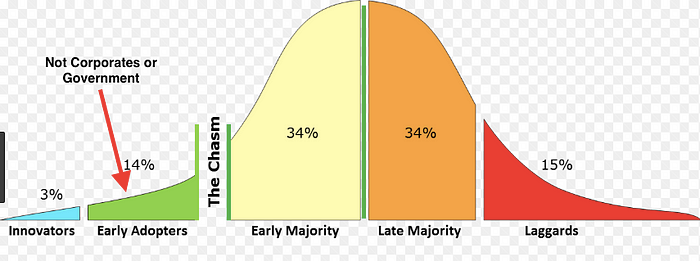Small markets limit the imagination. Big markets obviously have the opposite effect. Could this be the reason expat entrepreneurs, at least temporarily, appear to be out executing their local peers in Silicon Savanna? Nature vs Nature.
Just for context I will risk stating a painfully obvious fact so don’t duh! me. Kenya’s economy is fishbowl tiny compared to advanced economies (duh!). As such it has a concomitant effect on our imaginations, after all, what we see is what we know. As a result, many local tech entrepreneurs implicitly internalize that success means building a product that will be adopted by the few large entities that dominate the business landscape. The thinking goes, “if I can sell this to the government or get that Safcom partnership then I am golden”.
The sad part is almost all of these efforts are dashed at the rocks of reality. If a startups entire go-to-market strategy consists of getting the blessings of one large prospective customer/partner how vulnerable is that entire project? The risk of failure is increased by at least a further 50% on the generally accepted 90% startup failure rate.
On the other hand if a market has 1000 or 10,000 prospective customers then simple logic suggests that the probability of getting to product-market-fit before running out of runway is only limited by the startups ability to engage prospective customers, learn, iterate and sell.
99% of the time having one giant entity as the gateway to your prospective market is recipe for disaster. The entrepreneur becomes a speculator and is no longer in control of his or her destiny. This is not why you started a company. Things degenerate to one extended pitch process with no means of knowing if progress is happening or not. What did they mean by this or that? You hand over control to non entrepreneurs, they can smell your neediness and will exploit it.
An even darker all too common theme is the stolen information or strategy syndrome. Almost every founder I know has at one point engaged with big brother on Waiyaki Way to their detriment. Taking a meeting with big brother is generally not a useful way for a founder to spend their time. Big brother has a tendency to crowdsource ideas and strategies and then poorly implement them. Why feed the beast? Take it as a given that nothing good ever comes out of those engagements. It is the opposite of what you should be spending your time on.
In Silicon Valley founders never engage Google or Facebook unless it is selling their product to one of their internal departments, an engineering integration/API/roadmap conversation or an acquisition negotiation with lawyers in tow. Those are the only reasons and ways a startup should engage with big corporates. Department level sales conversation, technical integration/partnership evaluation, or an acquisition negotiation.
The reality is majority of the time a startups product is not yet mature enough for a corporate to use. Second, if your product requires more than a simple tactical API level integration with a large corporate that is a bad situation for you. Third, we are not yet at the point where local corporates are in the habit of acquiring external innovations. This will come, but si sasa (not yet).
What all this means is if a Silicon Savanna startup is taking meetings with big brother or a government entity it is very likely a waste of time and energy. Corporates and public sector are not innovators or early adopters. They are status quo protectors. Focus on your early adopters and diligently pursue the proven technology adoption life cycle.

